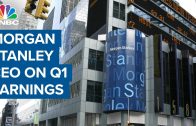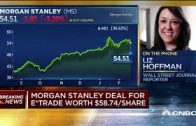Morgan Stanley CEO on Q1 earnings, reopening the economy and more
James Gorman, CEO of Morgan Stanley, joins “Squawk on the Street” by phone to discuss the company’s first-quarter earnings results, how the business community is responding to the coronavirus crisis, what an economic recovery could look like and more.
Morgan Stanley on Thursday posted first-quarter profit that missed analysts’ expectations and warned that a sole bright spot for the industry, robust trading results, may prove to be fleeting.
The bank said earnings dropped 30% to $1.7 billion, or $1.01 a share, compared with the $1.14 estimate of analysts surveyed by Refinitiv. Companywide revenue of $9.49 billion was also below the $9.73 billion estimate. Morgan Stanley shares dipped less than 1%.
Morgan Stanley said the coronavirus pandemic impacted each of its major businesses, creating turmoil in financial markets that hit the value of loans, investments and some trading assets, and sapped interest income and investment banking fees. At the start of 2020, that was partly offset by robust trading results that benefited from the sudden surge in volatility, but the bank warned that the boost could peter out as the crisis wears on.
“Though we are unable to estimate the extent of the impact, an extended period of depressed economic activity necessitated to combating the disease, and the severity and duration of the related global economic crisis, will adversely impact our future operating results, and the attainment of our financial targets,” the bank warned. It added that the new environment might feature “many of the same negative impacts and without the potential benefit of higher client trading activity experienced in the first quarter.”
The firm’s massive wealth management division posted revenue of $4.04 billion, an 8% decline that missed analyst estimates, on lower interest income and asset values. Revenue in the investment management division fell 14% to $692 million, below the $757.8 million estimate, as the bank took asset writedowns.
As with rival banks, trading results were strong: Revenue jumped 30% from a year earlier, and fixed income desks generated $2.2 billion in revenue, half a billion dollars more than expected. Equities desks also outperformed, making $2.42 billion in revenue, almost $200 million more than expected.
Investment banking revenue slipped 1% to $1.14 billion, below the $1.26 billion estimate, as higher debt issuance couldn’t entirely make up for lower activity in IPOs and lower demand for M&A advice.
For access to live and exclusive video from CNBC subscribe to CNBC PRO:
https://cnb.cx/2JdMwO7
» Subscribe to CNBC TV: https://cnb.cx/SubscribeCNBCtelevision
» Subscribe to CNBC: https://cnb.cx/SubscribeCNBC
» Subscribe to CNBC Classic: https://cnb.cx/SubscribeCNBCclassic
Turn to CNBC TV for the latest stock market news and analysis. From market futures to live price updates CNBC is the leader in business news worldwide.
Connect with CNBC News Online
Get the latest news: http://www.cnbc.com/
Follow CNBC on LinkedIn: https://cnb.cx/LinkedInCNBC
Follow CNBC News on Facebook: https://cnb.cx/LikeCNBC
Follow CNBC News on Twitter: https://cnb.cx/FollowCNBC
Follow CNBC News on Instagram: https://cnb.cx/InstagramCNBC
#CNBC
#CNBC TV



























